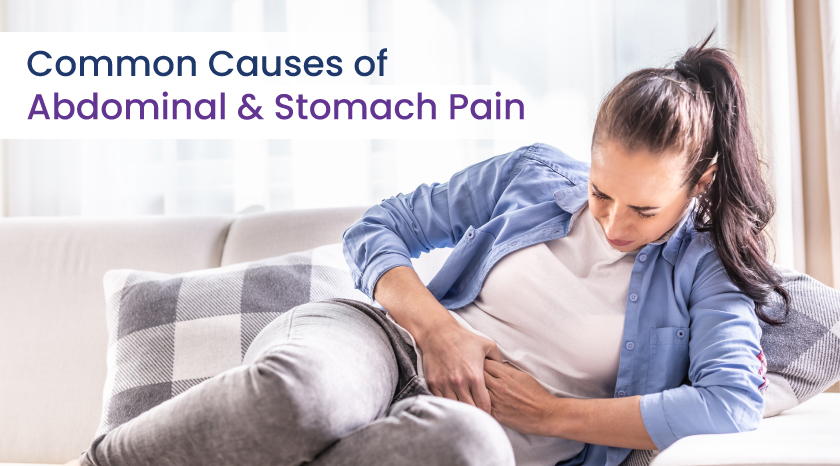Experiencing abdominal and stomach pain can be a distressing and uncomfortable ordeal. From mild aches to sharp, stabbing sensations, such pain can significantly impact our daily lives and productivity. In this article, we will delve into the various causes and treatment options for abdominal and stomach pain, aiming to provide you with a comprehensive understanding of this common ailment.
Abdominal and stomach pain can have a multitude of causes, ranging from mild to severe. Gastrointestinal issues, such as indigestion, reflux, and irritable bowel syndrome (IBS), are among the most common culprits. These conditions can result in pain, bloating, and discomfort, often triggered by certain foods or stress.
Infections, such as gastroenteritis or urinary tract infections (UTIs), can also cause abdominal and stomach pain. These infections may be accompanied by other symptoms like fever, nausea, and diarrhea. It’s crucial to identify the source of infection and seek appropriate medical treatment to alleviate the pain.
Inflammation within the abdominal and stomach area can be another cause of pain. Conditions like gastritis, pancreatitis, and appendicitis can lead to intense pain that requires immediate medical attention. Identifying the underlying cause of inflammation is essential for effective treatment and management.
Understanding the different types of abdominal and stomach pain
Abdominal and stomach pain can vary in intensity, location, and duration, making it essential to understand the different types. The pain can be categorized as cramp-like, sharp, dull, or burning, depending on the underlying cause. Each type of pain may indicate a specific condition or trigger, helping to narrow down the potential causes.
Cramp-like pain is often associated with gastrointestinal issues, such as gas, bloating, or constipation. This type of pain is typically relieved by passing gas or having a bowel movement. Sharp pain, on the other hand, can be a sign of a more severe condition, such as gallstones or kidney stones. These conditions may require medical intervention to alleviate the pain and prevent further complications.
Dull pain is often associated with chronic conditions like IBS or gastritis. It may persist for an extended period, causing discomfort and affecting daily activities. Burning pain, commonly experienced in the upper abdomen, can be a symptom of acid reflux or gastritis. Understanding the type of pain you are experiencing can assist in identifying the underlying cause and seeking appropriate treatment.
When to seek medical attention for abdominal and stomach pain
While mild abdominal and stomach pain can often be managed at home, certain situations warrant immediate medical attention. If the pain is severe, persistent, or accompanied by other concerning symptoms like fever, vomiting blood, or difficulty breathing, it’s crucial to seek medical help. These symptoms may indicate a more serious condition that requires prompt intervention.
Additionally, if the pain is sudden and unbearable, it may be a sign of a medical emergency, such as a ruptured organ or an ectopic pregnancy. In these cases, it’s vital to call emergency services or go to the nearest emergency room for immediate evaluation and treatment. Ignoring severe or concerning abdominal and stomach pain can lead to complications and further health issues.
Home remedies for relieving abdominal and stomach pain
For mild to moderate cases of abdominal and stomach pain, several home remedies can provide relief. Drinking warm water or herbal teas, such as chamomile or peppermint, can help soothe the stomach and alleviate discomfort. Applying a heating pad or taking a warm bath can also help relax the muscles and reduce pain.
Certain dietary adjustments can also assist in managing abdominal and stomach pain. Avoiding trigger foods, such as spicy or fatty foods, can help prevent flare-ups of conditions like acid reflux or gastritis. Consuming smaller, more frequent meals and chewing food thoroughly can aid in digestion and reduce the risk of indigestion or bloating.
Incorporating stress-reducing techniques, such as meditation, deep breathing exercises, or gentle yoga, can also have a positive impact on abdominal and stomach pain. Stress can exacerbate gastrointestinal issues, so finding ways to relax and unwind can help alleviate symptoms. However, it’s essential to note that home remedies are not a substitute for medical advice, especially if the pain persists or worsens.
How to prevent abdominal and stomach pain
Preventing abdominal and stomach pain starts with adopting a healthy lifestyle and making conscious choices regarding diet and overall well-being. Eating a balanced diet rich in fiber, fruits, and vegetables can help maintain regular bowel movements and prevent constipation or bloating. Drinking an adequate amount of water and staying hydrated is also crucial for optimal digestion.
Avoiding trigger foods and practicing portion control can aid in preventing conditions like acid reflux or indigestion. It’s important to identify your personal trigger foods and make informed choices to minimize discomfort. Regular exercise, stress management, and getting enough sleep are also essential components of preventing abdominal and stomach pain.
Maintaining good hygiene practices, such as washing hands regularly and avoiding contaminated food or water, can help prevent infections that may lead to abdominal and stomach pain. Taking care of your overall health and addressing any underlying conditions promptly can play a significant role in preventing recurring episodes of pain.
Medical treatments for abdominal and stomach pain
In more severe cases or when home remedies are not effective, medical treatments may be necessary to alleviate abdominal and stomach pain. Over-the-counter medications like antacids or pain relievers can provide temporary relief for conditions like indigestion or mild gastritis. However, it’s important to consult a healthcare professional before taking any medication to ensure it is safe and appropriate for your specific situation.
For more complex conditions like IBS or inflammatory bowel disease (IBD), prescription medications and specialized treatments may be required. These can include antispasmodics, antibiotics, or medications that target inflammation. It’s crucial to work closely with a healthcare provider to develop an individualized treatment plan that addresses your specific symptoms and concerns.
In certain cases, surgical intervention may be necessary to address the underlying cause of abdominal and stomach pain. Conditions like appendicitis, gallstones, or hernias may require surgical removal or repair to alleviate the pain and prevent further complications. Your healthcare provider will assess your condition and recommend the most appropriate course of action.
Lifestyle changes for managing abdominal and stomach pain
In addition to medical treatments, making lifestyle changes can have a significant impact on managing and reducing abdominal and stomach pain. Quitting smoking and limiting alcohol consumption can improve overall digestive health and reduce the risk of conditions like gastritis or reflux. It’s important to work with a healthcare professional or specialist to develop a personalized plan that suits your specific needs.
Incorporating regular exercise into your routine can also aid in managing abdominal and stomach pain. Exercise helps stimulate digestion, reduce stress, and promote overall well-being. It’s important to choose activities that you enjoy and can comfortably engage in, ensuring that exercise becomes a sustainable part of your lifestyle.
Managing stress is another crucial aspect of managing abdominal and stomach pain. Stress can disrupt digestion and exacerbate symptoms, so finding healthy ways to cope with stress is essential. This can include practicing relaxation techniques, engaging in hobbies or activities that bring you joy, and seeking support from friends, family, or professionals when needed.
Coping with chronic abdominal and stomach pain
For individuals dealing with chronic abdominal and stomach pain, it’s important to develop coping mechanisms and seek additional support. Chronic pain can have a significant impact on mental and emotional well-being, so addressing these aspects is crucial for overall quality of life. Seeking therapy or counseling can help individuals develop strategies for managing pain and improving their overall outlook.
Engaging in support groups or connecting with others who are going through similar experiences can also provide valuable support and understanding. Sharing experiences, tips, and advice can help individuals feel less isolated and provide a sense of community. It’s important to remember that everyone’s journey is unique, and finding what works best for you may require some trial and error.
Abdominal and stomach pain can range from mild discomfort to severe agony, affecting our daily lives and overall well-being. By understanding the various causes and treatment options, we can take proactive steps to alleviate pain and improve our quality of life. Whether it’s through home remedies, medical treatments, or lifestyle changes, there are numerous ways to find relief and manage abdominal and stomach pain effectively. Remember to consult a healthcare professional for accurate diagnosis and personalized advice for your specific situation.




